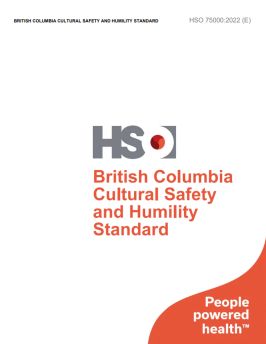British Columbia Cultural Safety and Humility Standard
What the Standard aims to achieve:
This Standard requires health and social service organizations in British Columbia to address Indigenous-specific racism in their care settings, and is a direct response to Recommendation 8, from, In Plain Sight: Addressing Indigenous-specific Racism and Discrimination in B.C. Health Care which documented widespread systemic racism in British Columbia’s healthcare system.
The Standard enables users to identify, implement, measure, improve and ultimately achieve culturally safe health care services that better address the health and wellness needs of First Nations, Inuit, and Métis peoples. The resource is intended for use by organizational leaders, organizational governance structures, teams, and people who work in health authorities, and health and social service organizations in British Columbia.
In addition to In Plain Sight, the Standard is informed by a series of other ground-breaking reports and Canadian legislative commitments, including:
- Reclaiming Power and Place: The Final Report of the National Inquiry into Missing and Murdered Indigenous Women and Girls (National Inquiry into Missing and Murdered Indigenous Women and Girls, 2019)
- Truth and Reconciliation Commission of Canada Calls to Action (Truth and Reconciliation Commission of Canada, 2015)
- United Nations Declaration on the Rights of Indigenous Peoples (United Nations, 2007)
- Canadian Human Rights Act (1985)
- Constitution Act, Part II, Rights of the Aboriginal Peoples of Canada, Section 35 (1982)
The Standard includes an overarching thematic statement on cultural safety and humility with criteria for assessment, followed by a set of requirements based in evidence. Each requirement includes a statement of intent, actions for implementation, and accountability mechanisms. A set of complementary guidelines provide additional context and information to support action and implementation of the Standard.
How it was developed:
The First Nations Health Authority and the Health Standards Organization partnered to develop the Standard. A First Nations-led technical committee steered the initiative, with contributions from the Métis Nation BC. A broad range of people were involved in its creation, including Indigenous thought leaders, administrators, healthcare providers, patients, knowledge keepers, and researchers. Through an extensive public engagement process, the team received 1,100 comments which were used to inform the Standard.
Use this resource to:
- Address Indigenous-specific racism in health and social services settings in British Columbia and create culturally safe care for First Nations, Métis, and Inuit peoples
- Identify ideas and information from the Standard that could be adapted for use in other health and social service contexts outside of British Columbia
- Advocate for the development of a similar standard that is specific to the needs of Indigenous peoples in jurisdictions outside of British Columbia
There are plans to review the Standard in 5 years to identify if changes or updates are required. The resource is available free of charge to health and social service organizations in British Columbia. For others, the Standard is available for purchase on the HSO website.
Related Resources:
- Implementing anti-racism interventions in healthcare settings: A scoping review (2021)
- A call to action to disrupt anti-Blackness in public health practice (2020)
- Let’s talk: Racism and health equity (2018)
- Key public health resources for anti-racism action: A curated list (2018)
- Indigenous cultural safety: Necessary for Indigenous health (2018)
- Colour coded health care: The impact of race and racism on Canadians’ health (2012)
Reference
First Nations Health Authority & Health Standards Organization. (2022). British Columbia Cultural Safety and Humility Standard. British Columbia.
Tags: Competencies & organizational standards, Cultural Safety, Indigenous health, Racism/racialization, Tool
